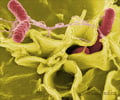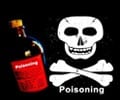A study by UC Santa Barbara researchers have revealed the discovery of a hypervirulent Salmonella strain that may help prevent food poisoning outbreaks.

An international team of scientists –– which also included Robert Sinsheimer and William Shimp from UCSB; Yi Xie and Bart Weimer from UC Davis; and John House from University of Sydney, Australia –– conducted a global search for hypervirulent Salmonella strains. They were found among isolates derived from livestock, and rendered current vaccines obsolete.
Bacteria behave like a Trojan Horse, exposing their weapons only after initiating infection. "These strains exhibit this behavior in the extreme –– essentially having a '5th gear' they can switch to during infection," said Heithoff, lead author of the paper.
Source-Eurekalert















